2002 年 3 月翻译资格英语高级口译笔试真题
Part A: Spot Dictation
Direction: In this part of the test, you will hear a passage and read the same passage
with blanks in it. Fill in each of the blanks with the words you have heard on the
tape. Write your answer in the corresponding space in your ANSWER BOOKLET. Remember
you will hear the passage ONLY ONCE.
I’ve been reading some very interesting research recently. It is about how people’s
moods are __________(1). In the past decade or so, there has been a great deal of
speculation about the relationship between the tow. You know, how they always say
that people __________(2) are more outgoing than those from the north. Well, it seems
that there __________(3) in it. Through many years of research, some scientists have
been able to show that if you are __________(4) a certain minimum amount of sunlight
only, whether in summer or winter, you may well become __________(5). A researcher
took a group of fifty people living in the northern part of Finland who went to their
doctor in the winter months and __________(6). In that part of Finland, which is
a Northern European country, there can be at most __________(7) a day. The researcher,
in order to achieve greater validity, chose as wide __________(8) as he could –
these were men and women, who were __________(9) and had different jobs or
professional careers, as __________(10) as possible. There were __________(11) in
the group as well as a couple of Americans. Half of the group __________(12 )a regular
amount of time on a sunbed and the other half of the group were given some
__________(13) which are used to relieve depression. After the treatment, the sunbed
group actually showed a faster and __________(14) than the pill group. Twenty out
of the 25 people in the sunbed group reported that they felt considerably better
after only __________(15) whereas the same number of people in the pill group said
that they __________(16) after seven days. All of the sunbed group said that they
felt considerably better __________(17) of using the sunbed whereas two of the pill
users still claimed that they __________(18) after six weeks of pill-taking and ten
of the pill group still felt marginally better. __________(19) seemed particularly
responsive to the sunbed treatment but there was __________(20) between the
responses of different nationalities.
Part B: Listening Comprehension
Directions: In this part of the test there will be some short talks and conversations.
After each one, you will be asked some questions. The talks, conversations and
questions will be spoken ONLY ONCE. Now listen carefully and choose the right answer
to each question you have heard and write the letter of the answer you have chosen
in the corresponding space in your ANSWER BOOKLET.
Questions 1 to 5 are based on the following conversation.
1.
(B) Because she sees the use of the Internet as too great a challenge for her.
(A) Because she is too busy finding information in the library.
�
(C) Because she herself has not yet got connected to the Internet.
(D) Because the sue of the Internet is not convenient or cheap.
(A) The places she is particularly interested in.
2.
(B) The places she has just found that day.
(C) Some electronic company sites.
(D) Some advertising pages.
(A) Marvell Electronics.
3.
(B) Andrew marvel.
(C) English language pages.
(D) The University of California.
(A) An interactive page.
4.
(B) A village in Suffolk.
(C) A house surrounded by soldiers and tanks.
(D) One of the regiments surrounding a house.
(A) A little bit sad.
5.
(B) Somewhat amused.
(C) Quite happy.
(D) Very much daunted.
(A) A big cut in the rate of unemployment.
Questions 6 to 10 are based on the following conversations.
6.
(B) A major increase in military spending.
(C) A boost in funding for domestic security.
(D) A reduction in government expenditure.
(A) An agreement on bilateral trade.
7.
(B) An agreement to solve controversial labour union issues.
(C) A treaty to settle the disputes over the territorial waters.
(D) A basic accord concerning an investment pact.
(A) Three
8.
(B) Four.
(C) Six.
(D) Seven.
(A) The Indian troops penetrated the Pakistani territory.
9.
(B) The Pakistani reserve divisions started to take up battle positions.
(C) Both sides called for a temporary 24-hour cease-fire.
(D) The two countries shelled each other’s territories.
�
10. (A) A group of five wanted to hijack the plane.
(B) A man attempted to blow up the airliner.
(C) There was a mechanical fault with one engine.
(D) One passenger was found to hold a false passport.
Questions 11 to 15 are based on the following news.
11. (A) When she was 50.
(B) Less than 20 years ago.
(C) A little more than 20 years ago.
(D) Around 30 years ago.
12. (A) They find it difficult to get jobs in law.
(B) They can’t practice full time.
(C) They get married and have children.
(D) They find the pay is not competitive.
13. (A) She feels that she is helping people solve problems.
(B) She is completely free to schedule her own time.
(C) She is amply rewarded through hard work.
(D) She thinks that he career wins her high respect.
14. (A) Family cases are often reserved for female barristers.
(B) Male and female barristers are not treated equally.
(C) Barristers have to wear wigs and gowns but solicitors are not allowed to.
(D) The job is very demanding no her time.
15. (A) The female judges are tougher on women than male judges.
(B) The male judges are not so sympathetic to women as female judges.
(C) Clients are sometimes trained as to how to behave towards female barristers.
(D) Male and female barristers retire at approximately the same age.
Questions 16 to are based on the following talk.
16. (A) Offering explanations for a broken personality.
(B) Advertizing a product for relieving depression.
(C) Discussing what is responsible for low moods.
(D) Recommending ways to fight bad feelings.
17. (A) A radio announcer.
(B) A television presenter.
(C) A psychiatrist.
(D) A magazine editor.
18. (A) Loneliness is only something that we suffer from sometimes.
(B) Only a few people around us feel lonely from time to time.
(C) Lonely people are advised to take some tablets.
�
(D) Eating and drinking at fixed times kill loneliness.
19. (A) Join a local sports club.
(B) Attend evening classes.
(C) Ask people round to stay with you.
(D) Do shopping with new friends.
20. (A) Buy a leaflet on loneliness.
(B) Send an envelope to Weekly News.
(C) Phone the speaker again.
(D) Go to se a psychiatrist.
SECTIONS 2: READING TEST
(30 minutes)
Directions: In this section you will read several passages. Each one is followed
by several questions about it. You are to choose ONE best answer, (A), (B), (C) or
(D), to each question. Answer all the questions following each passage on the basis
of what is stated or implied in that passage and write the letter of the answer you
have chosen in the corresponding space in your
ANSWER BOOKLET.
Questions 1~5
Helen Beasley says she did not set out to become a surrogate mother. The 26-year-old
legal secretary from Shrewsbury, England, a single mom with a 0-year-old son, was
thinking more about becoming a paid egg donor. When she bought her first computer
and did some research on the Internet, the tales of childless couples she came across
broke her heart, she says, and made her think of going one step further, as some
20,000 surrogate moms do each year in the U.S. “The more I though about it,” she
says, “the more I thought of happy endings.”
Six-and-a-half months after her first surrogate pregnancy began, as twin babies kick
inside her, Beasley could not be much farther from a happy ending. She’s mired in
a bitter legal battle with Charles Wheeler and Martha Berman, the San Francisco
attorneys who found her classified ad on the Internet and flew her over last March
for a trip to a fertility clinic. Pregnant with one more baby than Wheeler and Berman
wanted, Beasley says, she has received only $1,000 of the $20,000 they originally
agreed to pay her. The fate of the twins she’s carrying but does not want or have
legal rights to will be decided by a California court, in one of the most bizarre
surrogacy cases yet.
Beasley acknowledges that Wheeler and Berman, who have refused to talk to the media,
made it clear in their discussions that they wanted just one child. What’s more,
notes Stanford law professor Deborah Rhode, “theirs was a very extensive contract.
There were 50 clauses providing for every contingency,” including the case of a
multiple pregnancy, a real possibility given that three donor eggs fertilized by
�
Wheeler’s sperm were implanted in Beasley’s womb. The contract required Beasley
to honor the couple’s decision about whether to have a selective reduction, the
termination of one or more fetuses in a multiple pregnancy. Still, Beasley says,
“I didn’t realize they would go so ballistic” over the idea of twins.
Beasley claims she would have gone through with the selective reduction had Wheeler
and Berman made the arrangements early in the pregnancy. But, as she tells it, there
was a lengthy e-mail row between the tow sides after Beasley returned to England:
it was a petty affair in which each accused the other of going on vacation without
warning, but it took weeks to mediate. By the time Wheeler and Berman booked
Beasley’s flight to California for the reduction, it was week 13 of her pregnancy,
she says.
At that stage, Beasley felt that terminating a fetus was wrong. Plus, the late date
increased the risk that both fetuses would be lost in the procedure. Her high blood
pressure was already complicating the pregnancy. Beasley claims that Wheeler and
Berman’s lawyer, who declined to comment, presented her with tow options: to
terminate one fetus as requested or terminate both and still get paid.
Unwilling to do either, Beasley tried to compromise option of seeking other potential
parents. She says both sides offered candidates but fought over what—if
anything—the newcomers would pay Wheeler and Berman for their in-vitro
fertilization and donor-egg expenses. In Britain the matter would have been simpler.
There, surrogate mothers have full legal rights to the babies they bear for at least
the first six weeks. But since the contract was signed in California, Beasley, now
living in San Diego, supported by her lawyer there, is suing to sever the couple’s
rights over the children and claim unspecified damages. By last Thursday the blood
was so bad that Berman had the man who came to serve her with papers thrown out of
her office building.
This very public debacle has surrogacy supporters pretty steamed too. “The only
victims I see in this case are those babies and surrogate parenting itself,” says
Shirley Zager, director of the Illinois-based Organization of Parents Through
Surrogacy, herself a surrogate mother. According to law professor Rhode, changes
of heart happen in only 4 out of every 10,000 legal surrogate arrangements; however,
such cases usually involve the surrogate mom wanting to keep her offspring after
they’re born. And even though they have been through a lot together, Beasley has
no such plans for the twins. “Financially, emotionally, I don’t have the means,”
she says. Their happy ending will have to wait.
1. According to the passage, Helen Beasley became a surrogate mother mainly because
________.
(A) she wanted to have a daughter of her own
(B) she liked to be a voluntary egg donor
(C) she had much sympathy for those childless families
(D) she needed the money from surrogate parenting
2. The word “row” in the sentence “there was a lengthy e-mail row between the
�
two sides” (para.4) can be replaced by ________.
(A) negotiation
(B) argument
(C) communication
(D) dialogue
3. It can be found from the passage that the contract between Beasley and wheeler
and Berman ________.
(A) was unfair to the surrogate mother
(B) was quite comprehensive and accepted by both parties
(C) did not include clauses related to multiple pregnancy
(D) specified the reduction of payment in case of multiple pregnancy
4. According to the passage, Beasley refused to terminate one of the fetuses out
of all the following reasons EXCEPT that ________.
(A) her high blood pressure would lead to danger in operation
(B) both of the twin fetuses would face the risk of being lost
(C) the termination would be too late after week 13 of her pregnancy
(D) the decision to reduce fetuses was cruel and unethical
5. Which of the following is NOT true according to the passage?
(A) Beasley is going to keep the twins herself.
(B) Both sides are seeking potential parents.
(C) The laws concerning surrogate mothering are different in the two countries.
(D) The case is quite unusual compared with most other surrogate cases.
Questions 6~10
Disaster crushes one man now, afterward others —Euripidies.
If there are any bystanders left in the world—people on the sidelines, unaffected
by major events of war, terrorism, global capitalism and technological change—they
are very few. Inhabitants of remote Pacific islands or the forests of the Amazon
might merit the description if they were not directly affected by environmental
problems and the encroachment of commercial hunger for raw materials. Similarly,
countries which claim neutrality are not really on no one’s side, they are on
everyone’s side—as revealed by the fact that escaped allied prisoners could find
safety in Switzerland during the war against Nazism, while at the same times their
pursuers could equally safely bank their money there.
But it is otherwise impossible for anyone now to stand aside from world affairs.
It is an illusion to think that one can avoid the line of fire, or claim exemption
from the effect of forces that smash and grind against each other internationally.
Civilian populations are now frontline troops; they became so in the 20th century’s
wars, suffering bombing and deprivation, their mobilization in those immense
struggles making them a target even in their homes, the aim being as much to unnerve
as to kill them—for a demoralized enemy is as good as a defeated one.
�
Terrorism has exactly the aim, as its name implies, of frightening civilian
populations into forcing their governments to concede. It takes only a few determined
people to achieve this, applying the lesson—learned from the Spartans at
Thermopylae via the Russian bands which harassed napoleon’s retreating Grand Armee,
to the resistance fighters and insurgents everywhere in the modern world—that small
forces can defeat big ones; in the case of whole populations, by means of
psychological war.
Thus a well-directed terrorist attack is destructive far beyond its primary site;
it can paralyze communications, clog the wheels of ordinary life, panic millions,
wipe value off stock exchanges, destroy industries and thereby livelihoods—all as
a function of purely psychological aftershock, whose effectiveness lies in its
reaching further outward in space and time, radiating outwards from the original
focus, in some respects intensifying in the process.
Saying that there are no bystanders any more means that everyone is involved in
everything.
Even inaction is action; if you see someone injured and do nothing to help, you have
acted negatively. There is a choice about one’s manner of involvement; as witness,
victim, fighter—for peace, and common sense; or as the kind who does physical battle,
which is justified when it opposes greater evils—or as helper of the victims, since
the only certainty is that there will always be victims. Running away does no good,
especially psychological and intellectual running away.
This does not just mean refusal to face the fact that we all now live in some degree
of physical danger, even in our ordinary lives in otherwise peaceful circumstances.
It also means refusal to recognize, think through and try to deal with the sources
of that danger—the sources of resentment, suspicion, hatred and finally conflict
within and between peoples. Among the main sources are these, and they are linked:
disparities in wealth and power, and fundamental differences of culture, especially
religious and moral culture. The link lies in the way wealth and power can, even
if unintentionally, make those in poverty and weakness feel humiliated and
therefore—in respect of their religious and moral culture—insulted. These inflame
more concrete causes of opposition, such as exist in the Middle East, the Balkans
and Ireland for more recent historical reasons. The mixture is always volatile, and
the cants of nationalism, of the sacred or (worst of all) both are ever handy for
whipping a dangerous minority into violent anger. The rest is tragedy.
This analysis implies the remedy, infinitely easier to state than to effect. it is
to make the world fairer, and to liberate it from the distorting influence of
antiquated beliefs—at the very least, by removing them from the public arena,
allowing everyone there to be an individual human being rather than a label, and
inviting our respect accordingly.
6. In front of terrorism, according to the author, _________.
(A) most of civilian populations are bystanders
(B) no one can be a bystander today
(C) there are still some bystanders in the world
�
(D) a bystander is sure to be on the side of terrorists
7. Which of the following is closest in meaning to the sentence “Civilian
populations are now frontline troops.” (para. 2)?
(A) Civilians are recruited into the army to fight terrorism.
(B) Civilians are mobilized to avoid terrorist attacks.
(C) Civilians become the direct victims of terrorist attacks.
(D) Civilians turn out to be losers in the psychological war.
8. With the statement “Even inaction is action”, the author implies all of the
following EXCEPT that ________.
(A) you can only act either positively or negatively
(B) you can no longer remain neutral
(C) you can not but avoid involvement in one way or the other
(D) you can only choose the manner of involvement
9. According to the author, the only way to get rid of terrorism is ________.
(A) to eliminate all the terrorists
(B) to change the attitude of bystanders
(C) to destroy the links between wealth and power
(D) to create a society with justice and equality
10. It can be concluded from the passage that _______.
(A) the sources of terrorism are varied and complicated
(B) terrorism originated in the Middle East
(C) terrorism has only had a short history
(D) the solution to terrorism is liberation from nationalism
Questions 11~15
One of the biggest surprises of my life in America is the New York City subway. I’ve
actually come to enjoy it. When I first moved here in 1989, well-meaning friends
warned me away from the already octogenarian underground railroad, notorious among
both residents and visitors as the least pleasant and most dangerous means of getting
around this City That Never Sleeps. Yet it was also the fastest and the most
economical means of doing so. With that dilemma, I began my life as a New Yorker—and
I’ve remained ambivalent ever since. The subway is the thing we love to hate.
Schedules are unreliable. Trains come when they come, or not at all. Breakdowns are
so frequent that women have been known to give birth, stuck in some tunnel. Staff
are few and their announcements incomprehensible. The infrastructure is ancient and
crumbling. From time to time, burst water pipes flood stations, paralyzing traffic.
The city’s homeless live on the platforms, sleeping on benches (or in the trains
themselves) and heightening passengers’ insecurity. Every few months the papers
report the familiar horror of yet another innocent randomly pushed under the wheels
of an oncoming train. Muggings, rapes and murders are not common, but they happen.
�
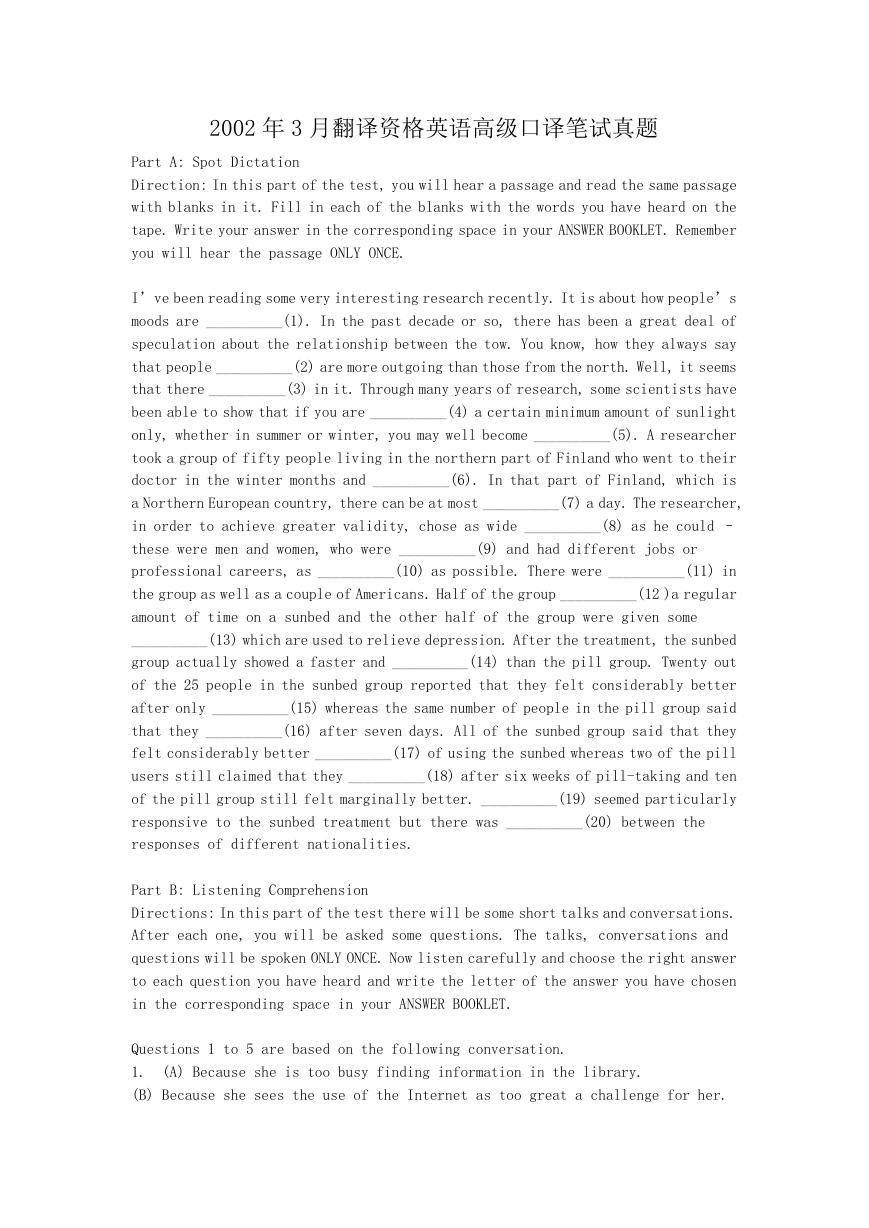
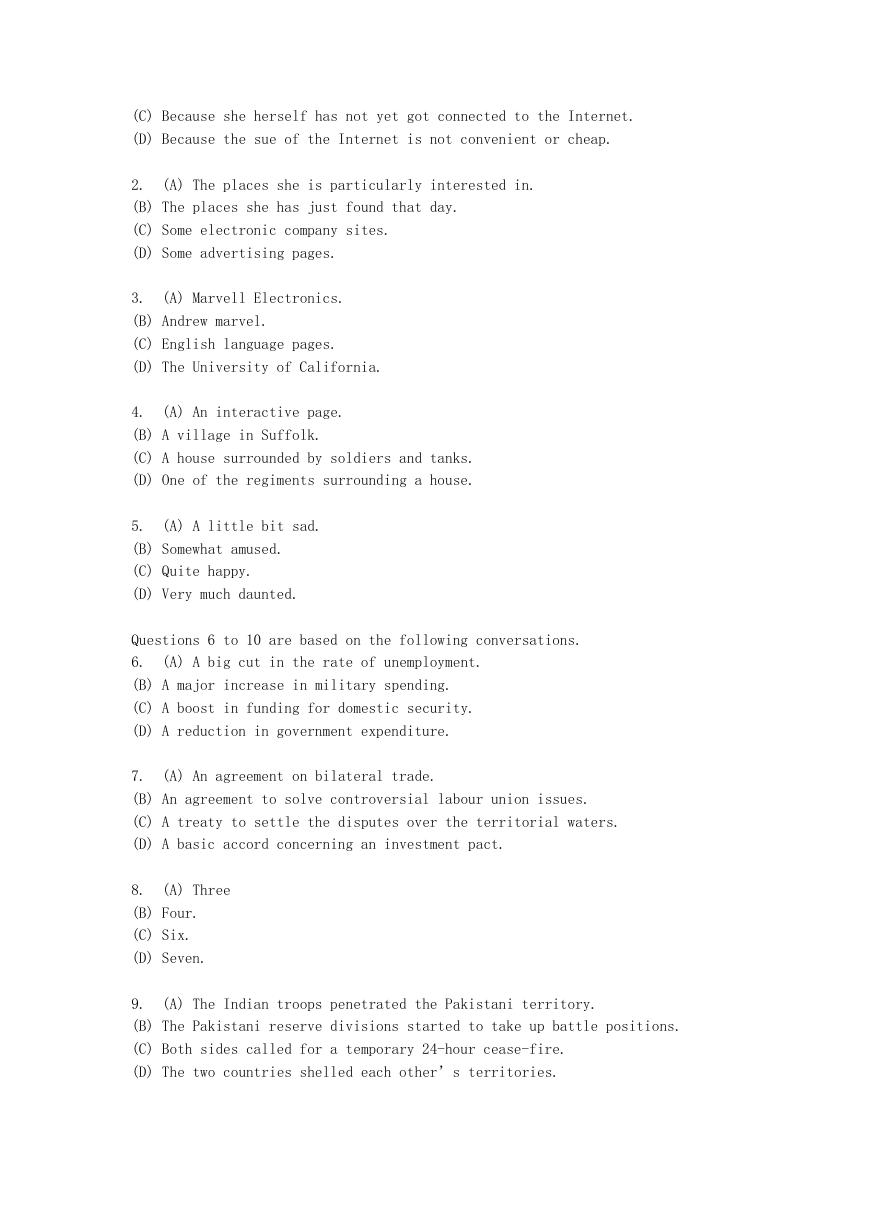


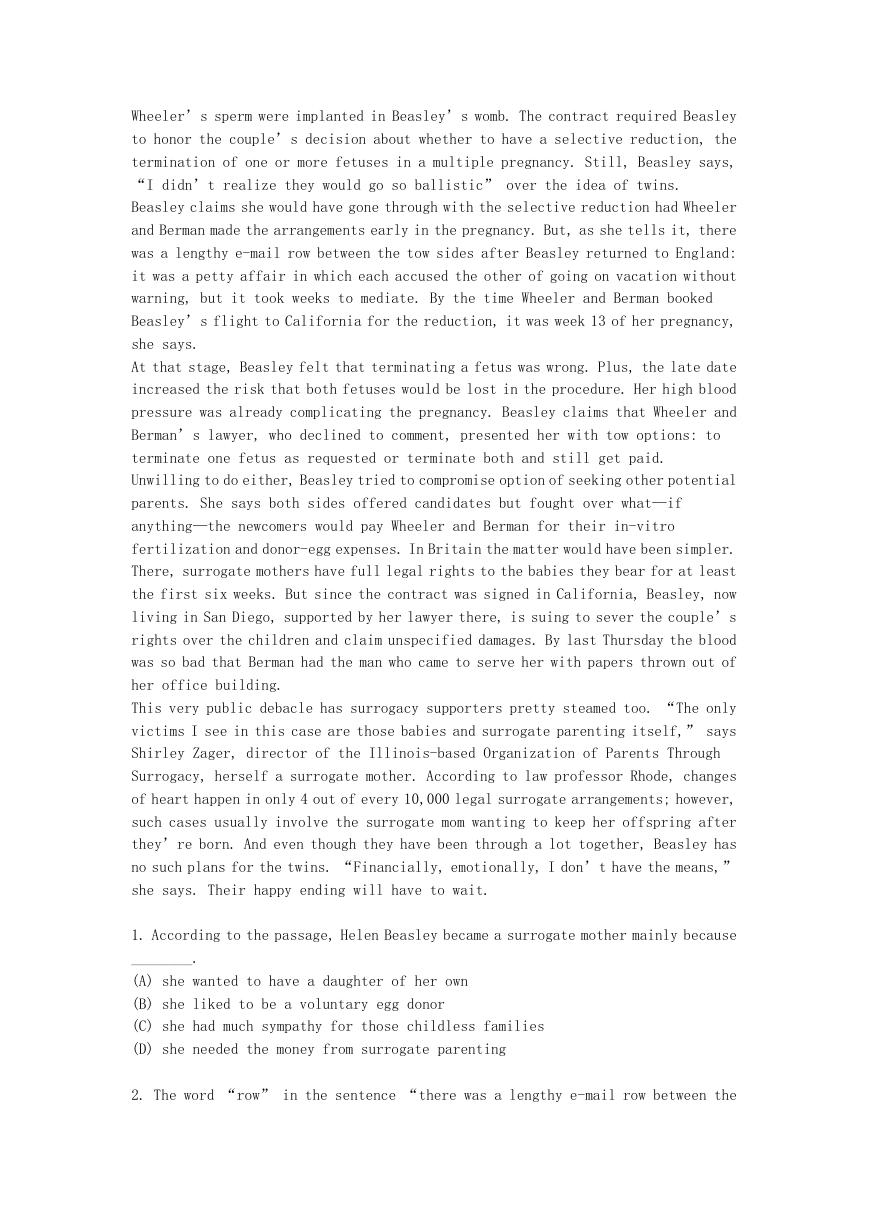
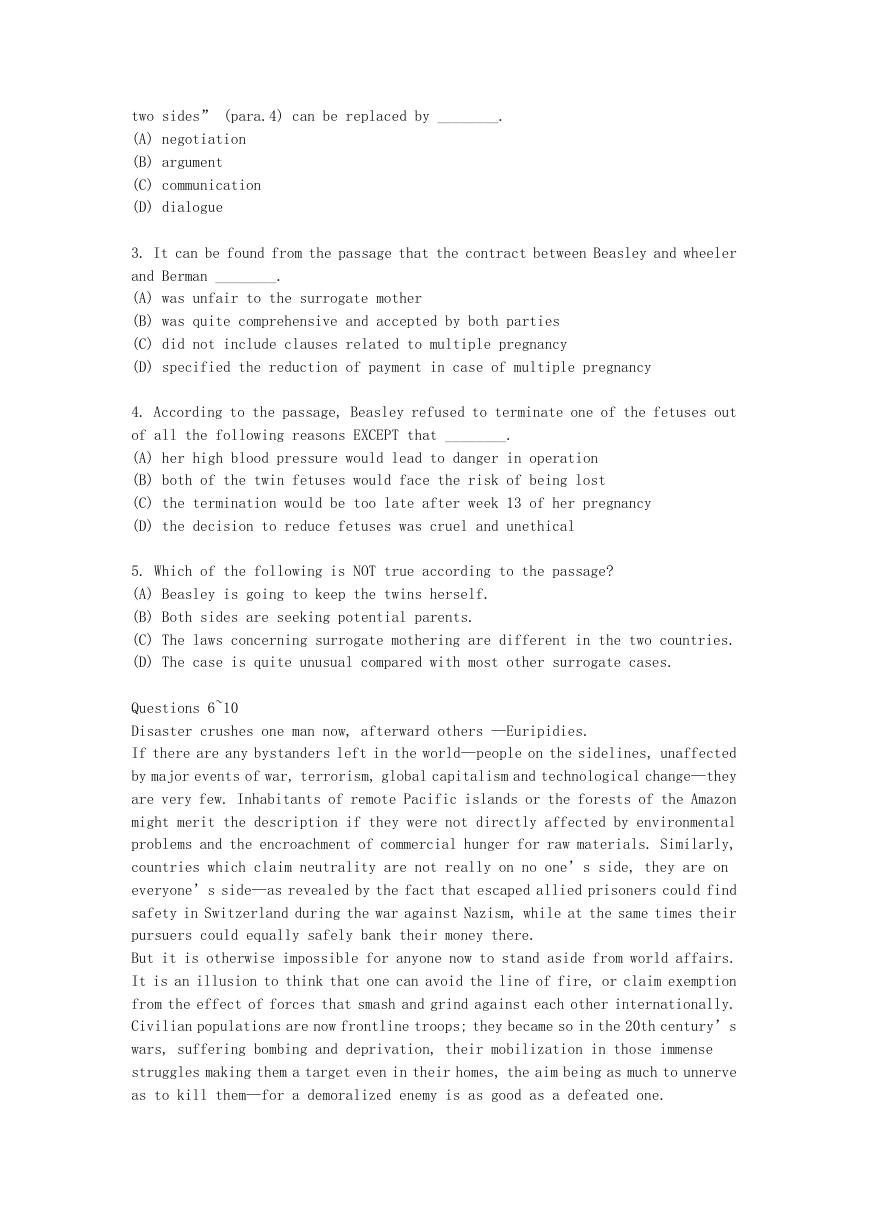
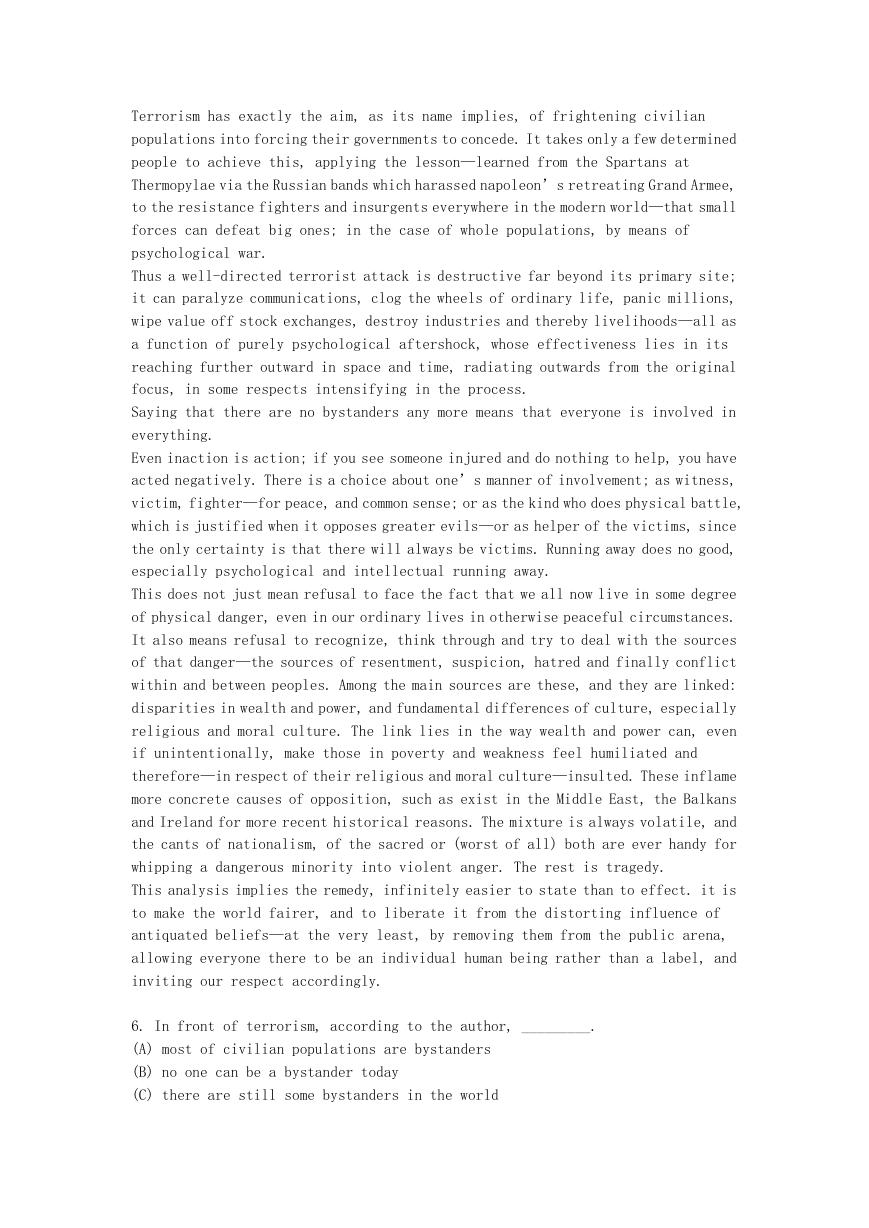
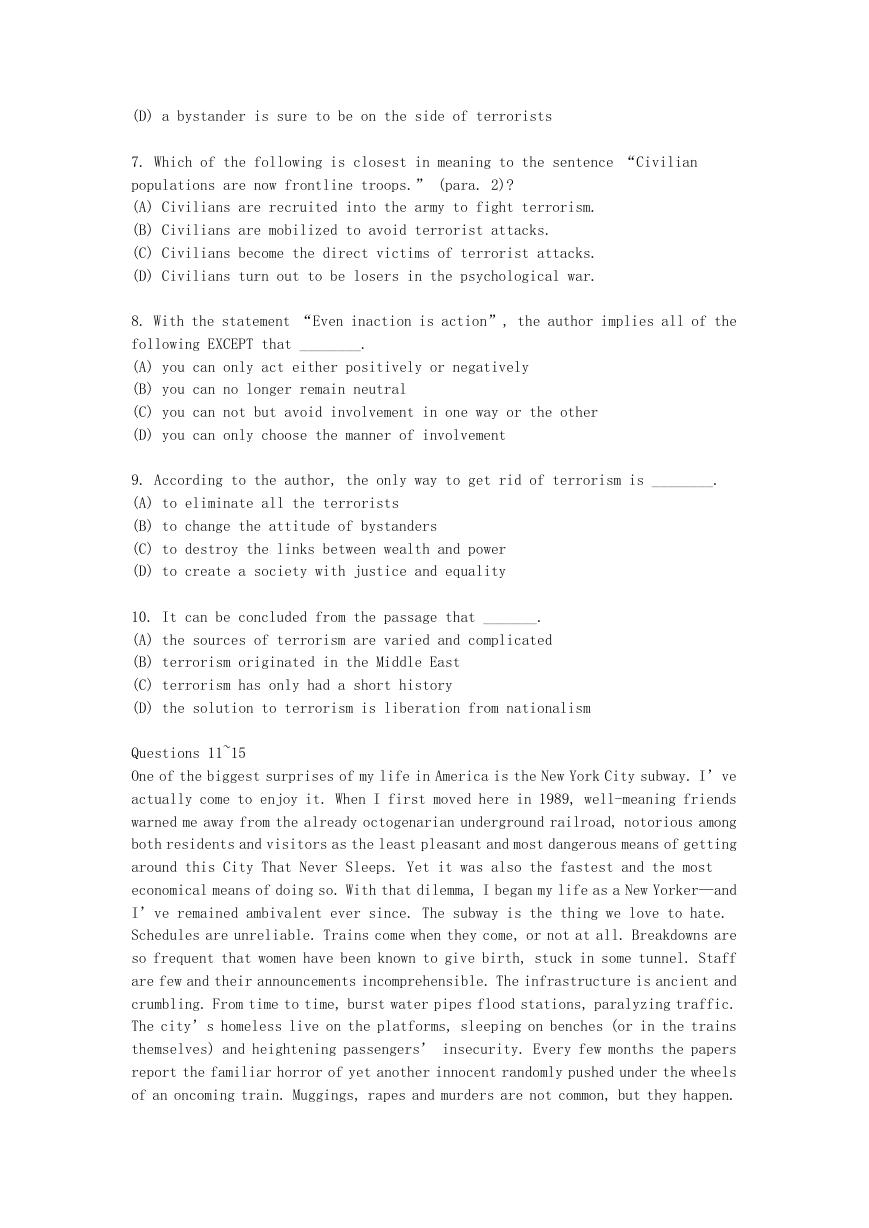








 2023年江西萍乡中考道德与法治真题及答案.doc
2023年江西萍乡中考道德与法治真题及答案.doc 2012年重庆南川中考生物真题及答案.doc
2012年重庆南川中考生物真题及答案.doc 2013年江西师范大学地理学综合及文艺理论基础考研真题.doc
2013年江西师范大学地理学综合及文艺理论基础考研真题.doc 2020年四川甘孜小升初语文真题及答案I卷.doc
2020年四川甘孜小升初语文真题及答案I卷.doc 2020年注册岩土工程师专业基础考试真题及答案.doc
2020年注册岩土工程师专业基础考试真题及答案.doc 2023-2024学年福建省厦门市九年级上学期数学月考试题及答案.doc
2023-2024学年福建省厦门市九年级上学期数学月考试题及答案.doc 2021-2022学年辽宁省沈阳市大东区九年级上学期语文期末试题及答案.doc
2021-2022学年辽宁省沈阳市大东区九年级上学期语文期末试题及答案.doc 2022-2023学年北京东城区初三第一学期物理期末试卷及答案.doc
2022-2023学年北京东城区初三第一学期物理期末试卷及答案.doc 2018上半年江西教师资格初中地理学科知识与教学能力真题及答案.doc
2018上半年江西教师资格初中地理学科知识与教学能力真题及答案.doc 2012年河北国家公务员申论考试真题及答案-省级.doc
2012年河北国家公务员申论考试真题及答案-省级.doc 2020-2021学年江苏省扬州市江都区邵樊片九年级上学期数学第一次质量检测试题及答案.doc
2020-2021学年江苏省扬州市江都区邵樊片九年级上学期数学第一次质量检测试题及答案.doc 2022下半年黑龙江教师资格证中学综合素质真题及答案.doc
2022下半年黑龙江教师资格证中学综合素质真题及答案.doc